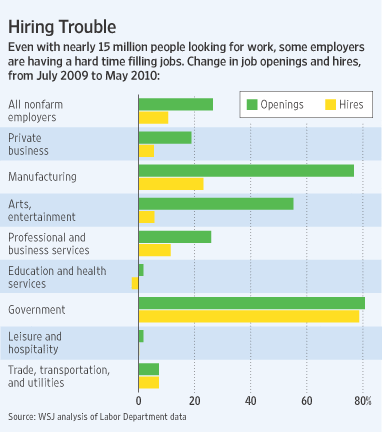I was having a cup of coffee the other day (those of you who know me, recognize this as code for: basically every moment of every day), when my wife asked me for some help applying for a job she’d seen in our childrens school district. Since I’m a geek around recruiting, job descriptions, etc, I got into it. The description – “.8 Technology Integrator” (gotta love a compelling job title, way to market the sexy on this one, Newburyport), seemed pretty straightforward, and a good match for her skills and experience.
Here’s where it gets interesting – here’s how a man generally sees things:
“There are 8 required skills. She has 6 of them down cold, one is easy to reboot (Mass teaching license, her’s is lapsed, but so what?), and one she can get done with a bit of time. Granted, the last one’s important – an Instructional Tech Specialist license, but she’s done enough homework on how to get it, and has enough relevant work experience that it shouldn’t be a big deal. On top of that, even if it rules her out for this exact position, the role’s open, and somebody somewhere is saying ‘I can’t keep working 60+ hours a week, at this point, I’ll take someone who can at least do part of the work, I’m desperate’.
Cool – they’re definitely going to at least want to talk with her, and it never hurts to try no matter what. At least her name will be in front of them, in case something else comes up. [Insert cliches about missing every shot you don’t take, foot in the door, something about eagles taking flight, yadda yadda]”
Here’s how my wife, and many women, see this (I know she does, because when I said basically the same thing I wrote above, to her, she gave me this response):
“Holy crap, I only meet 6 of the requirements, they’re never going to want to talk to me. I’m not going to apply.”
You may have noticed a slight… difference, in our perspective. Women seem to self-select out very early in the hiring process. Heck, they don’t even really start the process. It seems to be powered by the confidence piece that Sheryl Sandberg talks about in Lean In.
This haunts me (quoted from an excelent Atlantic article by Katty Kay and Claire Shipman):
“Hewlett-Packard discovered several years ago, when it was trying to figure out how to get more women into top management positions. A review of personnel records found that women working at HP applied for a promotion only when they believed they met 100 percent of the qualifications listed for the job. Men were happy to apply when they thought they could meet 60 percent of the job requirements.”
Now, admittedly, some of what I’m writing about is anecdotal – and, Curt Rice has a critical critique of the HP piece on his blog (he writes on gender equality, etc, and is very much a white hat) – so take it as this: not hard and fast data. But… personal experience, research that begins to back it up, very little that opposes that data, and my experience working with job applicants seems to bear the theory out. It’s an issue, and we need to understand it.
So, here’s the thing: if you do, in fact, do this, opting out before you even opt it: stop it. (Heck, if you’re a man and you do this, stop it, too). Stop selling yourself short. I know there’s a ton behind this, that our society has been programming you since the get-go (eff you, Mattel!) to think of yourselves as somehow not as strong, not as lucky, not as… men. And that’s probably one of the stinkiest piles I’ve come across in a long time. Each and every one of you has one shot in life, just like the men you know. Each and every one of you is not defined by gender, but by who you are, and what you chose. Chose to apply for that job, if you fall somewhere in the ballpark (within some level of reason: that degree in writing poetry – yes, that’s a thing I did – means my dreams of applying for a role as a rocket scientist are likely shot, but it does mean I’m not shy about thinking I’d make a hell of a ad copywriter if I ever decided to walk that path).
Cliche inserting time: you miss every shot you don’t take, and there’s no penalty for taking the shot. Go forth, and conquer. Yadda yadda.





